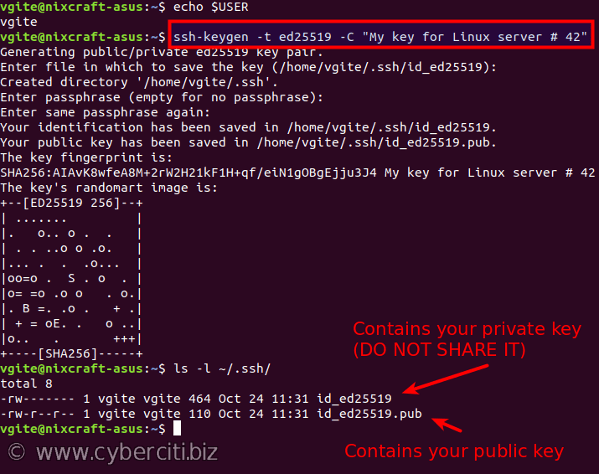Ubuntu Generate Ssh Key For Another User

Step 1: Generate a SSH Key Pair. If you’re using another Linux computer to connect to the server, then generaing SSH key pair and exporting it to the server should be a bit easier than a non Linux host To generate a SSH key pair, run the commands below from the Linux client machine. That should generate a key pair ( private.
- The ssh keys are not personalized, so you can create the key under your user and then just paste your public key to the target user's authorizedkeys on the remote server. Thus, if you have key generated on your local workstation under 'thufir', and want to logon to remote server as 'ubuntu', you need to copy contents of your.ssh/idrsa.pub to.
- Jul 29, 2019 How to Generate SSH Keys on Ubuntu 18.04 Installing SSH Server. Step 1- Generate the SSH Key Pair. Step 2- Copy Public Key to the Ubuntu Server. Step 3- Log in to the Remote Server. Step 4- Disable Password Authentication.
- Create a User. Let's create a new user and then setup some security. New User # login first sudo adduser fideloper # Create password # Skip extra field # Set Y to save the new user # Become new user fideloper sudo su fideloper # Head to home directory cd / # See the file path pwd # /home/ubuntu Setup SSH Key Authentication. We can re-use the.
Ssh Generate Key
I have Ubuntu Linux 18.4 LTS server running on AWS cloud. How do I create a user account on Ubuntu Linux server using the command line?Introduction : By default, the cloud server comes with a user named ubuntu. You can use such primary user account for sysadmin tasks on Ubuntu. However, sometimes you need to add a user account on Ubuntu for additional sysadmin tasks. This page shows how to create a regular user account or sysadmin account on the Ubuntu server.
Steps to create a user account on Ubuntu Linux
- Open the terminal application
- Log in to remote box by running the ssh user@your-ubuntu-box-ip
- To add a new user in Ubuntu run sudo adduser userNameHere
- Enter password and other needed info to create a user account on Ubuntu server
- New username would be added to /etc/passwd file, and encrypted password stored in the /etc/shadow file
Let us see all commands in details.
Ubuntu create user account commands
Let us say you need to add a new user in Ubuntu called vivek, type the following command in your shell:$ sudo adduser vivek
Type your own password and other info:
Verification
Use the grep command or cat command as follows:$ cat /etc/passwd
$ grep '^vivek' /etc/passwd
Sample outputs:
How do I log in using ssh?
From your Windows (WSL) or macOS or Linux desktop, run:$ ssh vivek@your-aws-ubuntu-server-ip
OR$ ssh -i ~/.ssh/aws.pub.key vivek@your-aws-ubuntu-server-ip
Enter the password when prompted.
Ubuntu Generate Ssh Key For User
Creating a user account using useradd command on Ubuntu
Alternatively, you can use the useradd command is a low level utility for adding users on Ubuntu. The syntax is:$ sudo useradd -s /path/to/shell -d /home/{dirname} -m -G {secondary-group} {username}
$ sudo passwd {username}
Let us create a new user named vivek using the useradd command on Ubuntu:$ sudo useradd -s /bin/bash -d /home/vivek/ -m -G sudo vivek
$ sudo passwd vivek
Where,
- -s /bin/bash – Set /bin/bash as login shell of the new account
- -d /home/vivek/ – Set /home/vivek/ as home directory of the new Ubuntu account
- -m – Create the user’s home directory
- -G sudo – Make sure vivek user can sudo i.e. give admin access to the new account
Ubuntu Generate Ssh Key For Another User Guide
I strongly recommend installing ssh keys while creating the new user account. You must have RSA/ed25519 key pair on your local desktop/laptop. Use the cat command to view your current RSA/ed25519 public key on the desktop:$ cat ~/.ssh/id_ed25519.pub
$ cat ~/.ssh/id_rsa.pub
Run the following commands on your Ubuntu server to install above ~/.ssh/id_ed25519.pub key from your desktop:$ sudo mkdir /home/vivek/.ssh/
$ sudo chmod 0700 /home/vivek/.ssh/
$ sudo -- sh -c 'echo 'ssh-ed25519 AAAAC3NzaC1lZDI1NTE5AAAAILaLvLmaW9qIbUVo1aDHWZE9JewbNfIdTVif2aFGF0E0 vivek@nixcraft' > /home/vivek/.ssh/authorized_keys'
$ sudo chown -R vivek:vivek /home/vivek/.ssh/
Now you can log in with ssh keys:$ ssh vivek@your-aws-server-ip-here
For more info see:
Conclusion
Ubuntu Generate Ssh Key For Another User Password
ADVERTISEMENTS